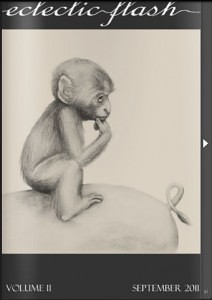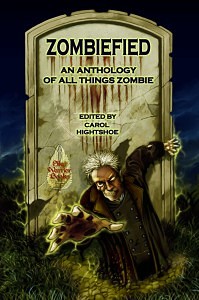Marge Simon has honored me with the oppourtunity to guest-write her poetry column in the HWA newsletter this month. I think the newsletters have gone out now. I say think because I’m not an HWA member. You know what’s intimidating? Writing a column for a newsletter you’re not qualified to receive — that is intimidating. Interestingly, the title of my column was ‘Poetry is Intimidating’ so apparently I’m being intimidated all over the place 😉
I guest-wrote another column for Marge back in February 2008. To celebrate my new column going live, I thought I’d share the old one here. The introduction was written by Marge Simon. Enjoy 🙂
Blood and Spades: Poets of the Dark Side
February 2008 / Volume 19, Issue 91 HWA Newsletter
It’s my pleasure to welcome Niteblade Editor, Rhonda Parrish. Here is a lady who supports both writers and poets of the dark fantastic and I think she’s doing a great job! Rhonda says, “I wanted to start an e-zine, to see what things looked like from the other side of the rejection letter, as it were. I chose to make it a fantasy and horror magazine after reading somewhere that fantasy and horror were dying genres. Dying genres indeed! I intended to contribute to the vast mound of proof to the contrary. I think the quality of the work in the pages of Niteblade speak loudly to the fact that fantasy and horror are not dying genres. Now if I can just finish revising my first fantasy novel and get it into some slush piles …”
Check out Rhonda’s Web sites: http://rhondaparrish.com/archive and http://www.niteblade.com.
* * *
A Poet’s Coming of Age
Rhonda Parrish
I used to love poetry, both reading and writing it. When I was younger I’d often get lost in a poem or catch myself composing verse in my mind when I should have been doing something else (usually math). In my small-town high school my familiarity with and love of poetry was well known and a point of pride for me. Alas, the disillusioning years subsequent to high school combined with a series of bad critique groups throttled my love of poetry (let’s call it Bob for short) and threw it, barely breathing, into a shallow grave.
Years later, after leaving my muse to rot in the same coffin as Bob, I cracked the lid. Sunlight burst in, and my muse and Bob whimpered and cowered in a corner. Much coaxing and cajoling later, they emerged, blinking and staggering. Though I nursed my muse, spoon-feeding her and helping her to grow before revealing her to the world, I denied Bob. Even as I wrote poetry I claimed, loudly and with vehemence, “I ain’t no poet.”
So it was, that when I first imagined Niteblade the poems were meant as filler–something to aid in marketing and fill the pages. Thankfully for Bob, the quality of poetry submissions I received inspired me to pay more attention to him, and he thrived. I stopped denying his existence, proudly telling people I was a writer, editor, and a poet. Bob is much healthier now, and growing stronger every day. It’s at his urging that I’ve written this short essay about what I look for in a poem for Niteblade.
When I look at poetry submissions to Niteblade I consider several things, many of which are intangible and strictly subjective, but some are pretty straightforward. First of all, I want to be entertained. To me, a poem needs to have something to say, a story to tell. I want to hear the tale and I don’t want to have to look too hard to find it. Basho’s haiku about the frog jumping into the pond may be considered by many to be brilliant because of its use of juxtaposition and what not, but to me it’s just a story about a frog jumping into a pond and, frankly, I don’t care. I don’t want to analyze a poem, I want to enjoy it. All the juxtaposition, alliteration, metaphor, and symbolism don’t mean anything to me if the poem’s story isn’t interesting.
Poems that have been accepted in Niteblade have told many tales. They’ve covered subjects from serial killers and killer plants to fairy babysitters and unrequited vampiric love. Each poem has its story to tell and does it with style and aplomb, capturing my attention with the first line and holding it until the last. As an example, here is a short poem I wrote which (I hope) tells a story in very few lines:
The Color of Shame
Drained of blood,
he traded his eternity for hers.
Sated, she smiled
With lips stained
the color of shame.
I’ve had to pass on many poems because I just had no idea what they were saying. I’m a bit lazy because of the whole “I don’t want to analyze a poem I want to enjoy it” thing, but I’m not stupid. If, after reading the poem three or four times I still don’t get it, I like to think the problem isn’t with me. I think implying rather than telling is a powerful tool for use in poetry–it can lead to those “ah-ha” moments we all love–but if the writer is too vague, the only person who can appreciate the piece is them.
Along the same line is my final point–a little cheese is not necessarily a bad thing, if you acknowledge it. I’ve written plenty of cheesy poetry; it’s fun and entertaining, so why not? The key, as I see it, is to not try and pass it off as high art. It’s fun, it’s fluff, and that’s all there is to it. For example, my poem “The Sepultress” is pure cheddar, but I like it:
The Sepultress
Her silken song of wind and wave
Called unto those beyond the grave
“Awake!” she cried, “And come to play!”
“I’ve only ’til the break of day.”
And to the shore the dead did come,
In groups of two and one by one
Once there they danced upon the sand
Whilst wicked waves served as the band.
A thousand corpses bobbed and swayed-
Cold bones ratt’ling a serenade
“Dance my children,” I heard her shriek
And terror made my knees go weak
From the shadows I watched their throes
While a foul stench assailed my nose.
With my shirt up over my face,
I loosed my guts, to my disgrace.
Above the bluffs, I spent the night
Afraid I might just die of fright
And when the dawn at last did break
All of the dead began to quake.
The power drained from empty eyes
As sunlight reached across the skies
Touched, she writhed upon the beach
Yet further still the beams did reach.
They swept across her gory crew
Who fell; puppets with strings cut through
I stood, transfixed as the tide rose
And shivered in my filthy clothes.
I watched the corpses float to sea
And knew no one would believe me
If I to them, did run and tell
About the night I spent in hell.
Because the water swept away
All evidence of their soiree
I lack the courage to be bold–
This pen’s the only soul I’ve told.
(Originally Published by NewMyths.com)
Bob is alive, well and satisfied that, no matter its role when I first envisioned it, poetry has taken a spot of equal importance as prose in the pages of Niteblade. In fact, I have it from a reliable source that the next cover will be based on a poem …
***
As an “interesting” footnote. It took a lot of willpower for me to not edit this column as I posted it, in particular I really wanted to remove the first line from “The Color of Shame” 😉
 I don’t usually blog on the weekend. Hell, I don’t usually work on weekends period, but I’m making an exception today because today is the last day of sanity before the crazy that is going to be my April hits. Before I get into that though, I’d like to take a second to say yay. Yay! I am still on track with my Write1Sub1 goals. And also, thank gawd for Write 1 Sub 1. Without it to use as motivation I don’t think I would have produced any new material this month. But I did.
I don’t usually blog on the weekend. Hell, I don’t usually work on weekends period, but I’m making an exception today because today is the last day of sanity before the crazy that is going to be my April hits. Before I get into that though, I’d like to take a second to say yay. Yay! I am still on track with my Write1Sub1 goals. And also, thank gawd for Write 1 Sub 1. Without it to use as motivation I don’t think I would have produced any new material this month. But I did.













